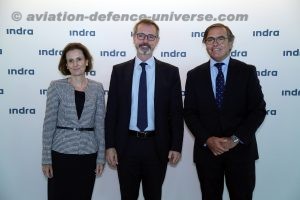- In this new phase, Indra has a solid strategic, commercial and business positioning and an extraordinary team of professionals with which it can aspire to be a leading player in a highly dynamic global industry with great potential that can generate a great deal of value for Spain, during a period of recovery when the European aid will drive projects and investment in many of its areas of strength and technological expertise

Madrid. 30 June 2021.– Indra’s Shareholders’ Meeting, held today, ratified the company’s new governance structure by a large majority, thus dividing the roles of chairman and chief executive officers and effecting the appointment of Marc Murtra as non-executive chairman and Cristina Ruiz and Ignacio Mataix as the joint and several chief executive officers.
The shareholders approved the Financial Statements and the Board of Directors’ Management Report, as well as the Sustainability Report, and passed all the resolutions proposed by the Board by a large majority. Among other points, this approval entails the ratification and re-election of Marc Murtra as a director in an external capacity and Ana María de Pro as an independent director, as well as the re-election of Enrique de Leyva and Ignacio Martín as independent directors and Ignacio Mataix and Cristina Ruiz as executive directors.
In his speech at the Shareholders’ Meeting, Murtra emphasized that “there are many reasons to look towards the future with confidence and hope. Indra has a solid strategic, commercial and business positioning and an extraordinary team of professionals with which we can aspire to be a leading player in a highly dynamic global industry with great potential that can generate a great deal of value for Spain, during a period of recovery when the European aid will drive projects and investment in many of our areas of strength and technological expertise”.
“My aim as chairman is to contribute my background, knowledge and experience to enhance Indra’s strengths and support the executive managers through my leadership of the Board and the duties that have been entrusted to me”, he declared.
Murtra also conveyed his thanks to Fernando Abril-Martorell for his time as chairman, praising the value of his management and the company’s transformation since he took office in 2015. “This transformation now allows us to launch a new era based on solid foundations and should encourage us to capitalize on the new opportunities for everyone who forms part of Indra”.
Ignacio Mataix and Cristina Ruiz, Indra’s CEOs, reviewed the trends and strategies of the company’s two divisions (Transport and Defence and Minsait, the latter devoted to Information Technology and Digital Transformation).
In 2020, Indra was able to react appropriately to mitigate the worst effects of the COVID-19 health crisis, while it successfully maintained its business continuity, acted decisively to minimize the negative impact of the downturn in activity and continued to enhance its commercial and strategic positioning.
The chief executive officers highlighted that, since the beginning of the pandemic, many of the critical and essential activities to ensure the smooth running of Spain have been supported by the work of Indra’s professionals, at times in very difficult conditions, such as the new support services for the healthcare systems of several autonomous regions, the ICO credit lines for Spanish banks and the development of new digital applications to allow the provision of an online service for Indra’s customers.
They demonstrated a high degree of motivation and commitment to Indra’s future and declared that the company’s two businesses are entering a new phase, with solid foundations enabling it to continue and further its growth and profitability strategy and excellent prospects for success in reinforcing its leadership in the technological areas in which it competes.
In this regard, they said that Indra’s initial challenge is to comply with the guidance for 2021 announced to its investors. Specifically, Indra expects:
- To obtain more than 3,200 million euros in income at a constant exchange rate.
- To obtain an EBIT of over 200 million euros.
- And to achieve a Free Cash Flow of more than 120 million euros in 2021, before the outflow resulting from the workforce transformation plans.
Achievement of the targets set for 2020
The chief executive officers recalled that, despite the worsening of the pandemic during the second half of the year, Indra met the 2020 targets it had pledged to its investors and shareholders in July of that year and underlined that Indra succeeded in increasing the value of its portfolio to a record high, with a 15.9% rise to 5,229 million euros, while the net order book rose by 8.4% to 3,850 million euros.
In that year, Indra achieved a Free Cash Flow of 83 million euros (121 million euros if the 38-million-euro cash outflow resulting from the COVID-19 workforce transformation plan is excluded), a positive figure in marked contrast to the 8-million-euro Free Cash Flow in 2019. In addition, the Net Debt fell to 481 million euros by the end of the year, set against the figure of 552 million euros in 2019, positioning it at its lowest level since 2010.
Transport and Defence: Excellent strategic prospects
“We currently have a very stable Transport and Defence business with excellent strategic prospects”, declared Ignacio Mataix, who pointed out that the ambition of the T&D business is “to set out again on the path towards profitable growth as soon as possible, leading on the basis of technological innovation in the Transport, Aerospace and Defence sectors, for which we’re an industrial and technological leader”.
This positive vision is based on factors such as the successes achieved in the evolution and transformation of the Transport segment’s range of products and services and, in particular, the strategic reorientation of the Defence division towards large-scale programs. At this moment in time, we should highlight the strategic role Indra is acquiring in Europe’s FCAS (Future Combat Air System) and its leadership and prominent participation in the European programs for the industrial development of Defence, ensuring its presence in the technological evolution set to mark the coming decades in that area.
Mataix stressed that “our priorities are focused on persevering and furthering our transformational measures, constantly improving efficiency and decisively promoting the evolution and digitalization of our products and services with large-scale programs as the driving forces behind our leadership in R&D”.
With regard to T&D’s strategic lines, Mataix stated that the company is going to focus on:
- Developing the future technologies to guarantee Indra’s competitiveness in the global market while relying on the position it has achieved in the large-scale programs that it has been awarded.
- Intensifying the technological differentiation of the product range by digitalizing the products and assisting clients in their digital transformation processes.
- Maintaining the focus on improving project execution based on growth as a way of enhancing internal and supply chain-related competitiveness.
- Prioritizing the portfolio of products and solutions and focusing on the key geographical areas for the
business.
Minsait: responding to and anticipating the acceleration of digitalization
Cristina Ruiz stated that “thanks to the profound transformation of recent years, Minsait is ready to continue with the evolution of its product range towards digital and high-value activities. Based on our undeniable strengths, we’ll be able to grow profitably, generate high-quality employment and capitalize on the opportunities created by the technological environment and the recovery and resilience plans, in which we hope to play a leading role”.
The chief executive officer declared that the recovery of the economy and the acceleration of its customers’ technological needs offer Minsait business opportunities, chiefly digital ones, that the company is in a position to take advantage of, highlighting the existence of sectors and geographical areas showing signs of recovery, and that the company can already observe the positive results of the actions undertaken during the most difficult moments of the crisis. “Minsait has the very best digital capabilities and a solid model that will undoubtedly enable us to continue along our path of growth and improved profitability”.
The company’s product range and development strategy responds to and seeks to anticipate this trend towards the acceleration of digitalization in all the sectors. Minsait has three key pillars that should help it recover while consolidating its growth path and improving its profitability. These are:
- Accelerating top-line growth through the high-growth product range strategy and focusing on regions with greater value, prioritizing sales efforts in what it calls acceleration vectors, such as cybersecurity, phygital (the digitalization of the physical world), the cloud, data analytics and payment methods.
- Continuing to develop the operating model, consolidating and furthering the productivity improvement plans and working on a new delivery and production model that takes full advantage of the potential for crosscooperation in the use of resources and the standardization of the product range.
- All this while continuing to identify opportunities for inorganic growth so as to complement the digital or optimization-related capabilities of Minsait’s business and regional portfolio.
Corporate Governance
Indra’s shareholders were informed of the most relevant aspects of the company’s Corporate Governance and the changes made since the last General Shareholders’ Meeting, the most noteworthy being, apart from the new governance structure:
- The adaptation of the Company’s internal regulations to the amendments of the Good Governance Code for Listed Companies approved by the CNMV in June 2020 and the amendments of the revised text of the Corporate Enterprises Act.
- The development and systematization of the standards of the Internal Code of Conduct in matters relating to the securities markets.
- The incorporation of pre-determined and quantifiable objectives linked to sustainability for the variable remuneration of the company’s directors.
- The intensification of the dialog with the stakeholders and the approval of a general policy for the reporting of economic-financial, non-financial and corporate information through the media, social media and other channels.


































































































































